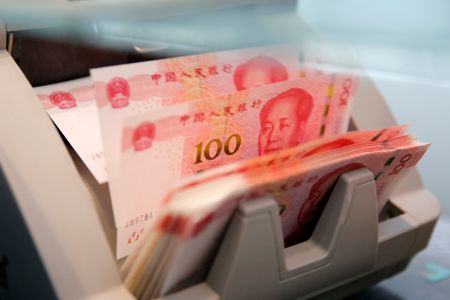BEIJING (Reuters) – Yuan loans extended by Chinese banks likely surged to a record high in January as the central bank moved to shore up growth in the world’s second-biggest economy following a lifting of pandemic controls.
Chinese banks tend to issue more loans monthly at the beginning of the year to get higher-quality customers and win market share.
They likely issued 4.00 trillion yuan ($590.14 billion) in net new yuan loans last month, nearly tripling the 1.4 trillion yuan issued in December, according to the median estimate in a Reuters survey of 23 economists.
That would be higher than the record 3.98 trillion yuan issued in January 2022.
China’s new bank lending hit a record 21.31 trillion yuan in 2022, up from 19.95 trillion yuan in 2021, the previous record.
GRAPHIC: Record high expected (https://tmsnrt.rs/3YuNuKAhttps://tmsnrt.rs/3YuNuKA)
“Monetary policy could be engineering a strong start of credit for the year, so as to pave the way for a strong start of the economy for the new administration,” analysts at Citi said in a note.
China’s new economic leadership is expected to take office in March.
The economy grew 3% in 2022, far below the official target of around 5.5%. It was one of its worst rates in nearly half a century. Growth is expected to recover to around 5% in 2023, after Beijing ditched harsh COVID-19 restrictions in early December.
The central bank has pledged to take steps to boost market confidence this year and has increase support for manufacturers and small companies.
To shore up flagging growth, the central bank cut the reserve requirement ratio for banks on Dec. 5, its second such move in 2022, releasing 500 billion yuan in long-term liquidity.
Outstanding loans on Jan. 31 were likely 11.0% higher than a year earlier, compared with 11.1% growth seen in the year to Dec. 31, the poll showed. Broad M2 money supply was likely 11.6% higher at the end of January than a year earlier, compared with the 11.8% annual growth seen a month earlier.
China’s local governments issued a net 4.04 trillion yuan in special bonds in 2022 to help spur investment and support the economy, finance ministry data have shown.
Last year, the cabinet told local governments to complete selling more than 500 billion yuan in special bonds under quotas carried over from previous years on top of 2022 quota of 3.65 trillion yuan.
Any acceleration in government bond issuance could help boost total social financing (TSF), a broad measure of credit and liquidity. Outstanding TSF was 9.6% higher on Dec. 31 than a year earlier, growing more slowly than the 10.0% annual rate seen in the previous month.
The January new TSF was likely 5.40 trillion yuan, up from 1.31 trillion yuan in December, according to the median estimate in the poll.
($1 = 6.7780 Chinese yuan renminbi)
(Reporting by Judy Hua and Kevin Yao; Editing by Bradley Perrett)

